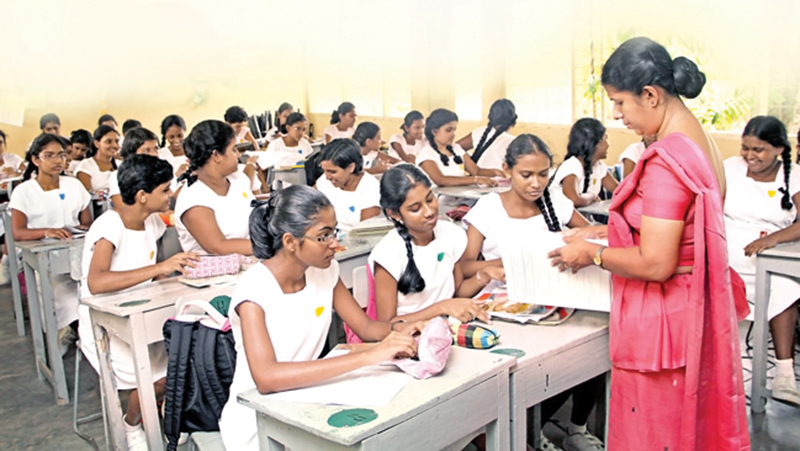 Some years ago, while following a training course in London, I was waiting at a Metro station when an advertisement pasted on the opposite wall of the platform caught my attention. It had just four words. Four words I will never forget. “Those who can, teach”.
Some years ago, while following a training course in London, I was waiting at a Metro station when an advertisement pasted on the opposite wall of the platform caught my attention. It had just four words. Four words I will never forget. “Those who can, teach”.
Indeed, the advertisement, which called on those willing to become teachers to apply to the education authorities, contained a powerful message – not everyone can teach. It takes something special to become a teacher – a person who guides the destinies of thousands of children over several decades of service. Our parents are our first teachers, but from age 5-6 onwards the teachers take over until we leave the education system (school, university or vocational) as worthy citizens.
Noblest profession
Teachers not only teach you lessons from textbooks, but they also teach the lessons of life. In a way, it is the latter that finally makes you a fine man or woman, someone who is useful to society and others around you. It is the teachers who mould good future citizens. And having had a mother who was a teacher herself, I know that all too well. To her, all students were her sons and daughters, not just her own children.
That is how teachers think. It is a noble, selfless thought. Teaching is undoubtedly one of the noblest professions on Earth. Teachers are people worthy of celebrating for what they bring into our lives: knowledge, discipline, values and skills.
But like every other sector in our country and elsewhere, the teaching profession too has undergone many changes and faced many challenges. The Covid-19 pandemic brought teaching in person to a halt, bringing online teaching and learning to the fore. Since then, some teachers have found out that online teaching is a profitable venture, where you can reach out even 1,000 students at the same time, from the comfort of home. Indeed, the education rat race has compelled parents to send their children to tuition classes from Grade 3 onwards, aiming at the Scholarship Examination in year 5. The competition is even more intense for GCE Ordinary Level and Advanced level examinations. Thus many teachers now focus more on either online or in-person tuition, rather than teaching at school.
Recently, we also witnessed the phenomenon of teachers striking work. This was simply unprecedented, because the teaching profession was among the few professions that never resorted to strikes. In other words, it was an unwritten rule that teachers should never participate in strikes, even if other public servants do. Now even this rule has been broken, with teachers taking to the streets making various demands and shouting slogans, leaving their charges in the lurch at schools. Some of them even engaged in brawls with the law enforcement authorities. This, of course, makes a very bad impression on students who look up to their teachers for guidance in every aspect of life.
Engaging in strikes, not the solution
Of course, there is no argument that teachers deserve to be treated better in terms of pay and other facilities. There still are teachers who are totally committed to their school work, without doing any private tuition. Some of them are known to hold free classes for weak students after school. They might find it difficult to make ends meet in the current economic climate, as the country is still recovering from the economic catastrophe of 2022. Nevertheless, engaging in strikes at the expense of students is not the solution. Lest we forget, the children from rich families attending elite private and international schools were not affected by the strikes.
 It was only the students in Government schools in urban and rural areas which bore the brunt of the sudden strikes. In fact, many students who had come to school were caught unawares by the strikes. For most students, coming to school itself is a costly affair, with school vans charging more than Rs.15,000 per month. One simply cannot quantify the damage caused to the students and even to the overall economy when teachers keep away from the classrooms.
It was only the students in Government schools in urban and rural areas which bore the brunt of the sudden strikes. In fact, many students who had come to school were caught unawares by the strikes. For most students, coming to school itself is a costly affair, with school vans charging more than Rs.15,000 per month. One simply cannot quantify the damage caused to the students and even to the overall economy when teachers keep away from the classrooms.
If this trend continues, we risk losing our leading position in terms of education indices, at last in this region. In countries that do have Universal Primary Education, schooling is compulsory for both sexes at least up to 15 years of age. Sri Lanka is one of the few developing countries with exemplary education statistics that often match those of the developed world, thanks to its free education policy, which covers the entire student life from primary grades to university. There has been no discrimination whatsoever towards girls in this country, in sharp contrast to several other countries in our region.
But the lack of teachers for certain grades and subjects is an acute problem. Even if a school has all physical facilities such as desks and chairs, good classrooms, lab facilities and playgrounds, no school is truly complete without good teachers. One cannot think of education without thinking of teachers. In this respect, the Government is taking urgent steps to appoint teachers especially to schools in remote areas.
In fact, one of the main challenges to the right of education worldwide is the continued shortage of teachers. There are an estimated 264 million children still out of school globally, and according to UNESCO, the world needs to recruit almost 69 million new teachers to reach the 2030 education goal of universal primary and secondary education. Millions of students are also staying at home after having dropped out during the pandemic.
This ‘teacher gap’ is more pronounced among vulnerable populations – girls, children with disabilities, refugee and migrant children, and poor children living in rural or remote areas. UNESCO estimates that to achieve the goal of universal primary education by end 2024, all countries will need to recruit over 13 million primary teachers in the short term.
Teachers deserve to be treated on par with the dignity and honour attached to their noble profession. Government teachers are also forced to undergo tremendous ordeals and inconveniences due to transfers, entailing disruption of their family lives. Some schools they serve in, particularly in the rural areas, are without basic facilities that are often highlighted in TV news bulletins. These too must be rectified whilst resolving any salary anomalies of teachers.
Changes
Time was when the teaching profession was looked upon with awe and reverence and teachers enjoyed recognition and respect as prominent citizens of society. One recalls the status enjoyed by the good old Iskole Mahattaya (teacher or principal) in the village who was considered an oracle of sorts, to whom villages flocked to, for advice and counsel. Sadly, this phenomenon is no longer in existence, the passage of time, like with everything else taking a heavy toll on old values and practices. This change in the times is even reflected in the conduct of our teachers who hardly have time to spare for their charges caught up in the rat race.
The perception of teaching as a profession is not all that rosy here and in many other countries. There should be a renewed drive to recruit trainee teachers which stresses the fact that teaching is a rewarding experience in more ways than one.
Quite apart from any monetary consideration, good teachers always take pride in moulding good citizens who are useful to society. That is one of the perks of being a teacher and only a very few other professions can make the same claim.
Teachers will be able to make an even bigger contribution if they are given more recognition, resources, training and facilities. They continue to face challenges brought about by poor training and low status. Teachers must be given every opportunity to receive additional training in the subjects they teach and other subjects as well. There is a dearth of teachers who can teach other subjects in English 9apart from English itself) and this must be rectified without delay. One must also not underestimate the service rendered by sports and physical training teachers, for sports help children become better citizens who can accept victory and defeat in sport as well as in life with equal composure.
Training needed
More training should be given to those who are already in the profession, with attention to career enhancement, promotion prospects and technology skills. A teacher’s education too is never complete. Teachers must also evolve with the times, because printed textbooks and traditional blackboards could go out of style in a decade or so. With Governments around the world intending to move to a tablet-based, paperless education system, teachers must be trained in new techniques of teaching with such devices. In Sri Lanka too, there is a move towards “smart classrooms”. We experienced the potential of this during the pandemic, though not all students had the devices (or the 4G signals) needed to get online lessons. But the future is here already and teachers must adapt. This is part of transforming education.
With today’s emphasis on online teaching and learning especially in a post-Covid environment, some experts wonder whether teaching could someday go entirely digital and virtual. But should there be a world without in-person teaching? I, for one, would not like to see in –person teaching go away. ‘Live’ interaction with a teacher makes lessons more interesting and rewarding. The human element is very much a part of education and in my opinion, it can never be entirely replaced with Artificial Intelligence (AI) and other smart machines which can, however, be an invaluable aid. The problems faced by teachers should be addressed but teachers, for their part, should also opt for negotiations instead of strikes. Long live the teachers of the world.







